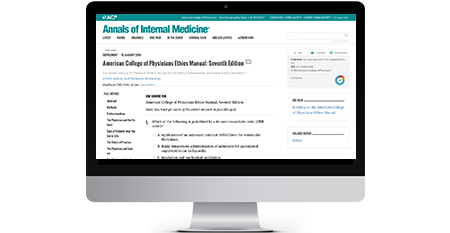Early in the COVID-19 pandemic unprecedented restrictions on allowing visitors in medical settings were deemed necessary to protect patients and healthcare workers (HCWs) in the face of a novel pathogen with unknown transmission risks, high morbidity/mortality, overwhelmed healthcare systems, and limited personal protective equipment (PPE). As time went on, however, clear evidence emerged regarding the unintended harms of visitor restrictions, while evidence demonstrating the necessity of such restrictions for protecting the health of patients and HCWs remained lacking (1). Even now, many visitor policies are not as accommodating as they were pre-COVID, threatening patient- and family-centered care and raising ethical concerns about determining the proper balance between protecting public health and fulfilling clinicians’ ethical obligations to individual patients (1,2). ACP’s Center for Ethics and Professionalism examines this topic in their latest case study, ‘“Why Can’t I Be There?” Ethics Regarding Restrictions on Visitation/Family Caregiver Presence’
First, read the case study. After reading, ACP members can take the CME/MOC survey for free.
CME/MOC:
Up to 0.75
AMA PRA Category 1 Credits™ and MOC Points
Expires April 18, 2027
active
Cost:
Free
Format:
Journal Articles
Product:
ACP Ethics and Professionalism
ACP is devoted to policy development and implementation on issues related to medical ethics and professionalism, and is a resource for ACP members and the public.
Authors
Kari L. Esbensen, MD, PhD, FACP - Author, Case History, Commentary
Amy K. Holbrook, MD, FACP - Author, Case History, Commentary
Lois Snyder Sulmasy, JD - Author, Commentary, Editor
Those named above, unless otherwise indicated, have no relevant financial relationships to disclose with ineligible companies whose primary business is producing, marketing, selling, re-selling, or distributing healthcare products used by or on patients. All relevant relationships have been mitigated.
Release Date: April 19, 2024
Expiration Date: April 18, 2027
CME Credit
The American College of Physicians (ACP) is accredited by the Accreditation Council for Continuing Medical Education (ACCME) to provide continuing medical education for physicians.
The ACP designates this enduring activity for a maximum .75 AMA PRA Category 1 Credit(s)TM. Physicians should claim only the credit commensurate with the extent of their participation in the activity.
ABIM Maintenance of Certification (MOC) Points
Successful completion of this CME activity, which includes participation in the evaluation component, enables the participant to earn up to .75 medical knowledge MOC point in the American Board of Internal Medicine’s (ABIM) Maintenance of Certification (MOC) program. It is the CME activity provider’s responsibility to submit participant completion information to ACCME for the purpose of granting ABIM MOC credit.
How to Claim CME Credit and MOC Points
After reading the article, complete a brief survey and multiple-choice question quiz. To claim CME credit and MOC points you must achieve a minimum passing score of 100%. You may take the quiz multiple times to achieve a passing score.


